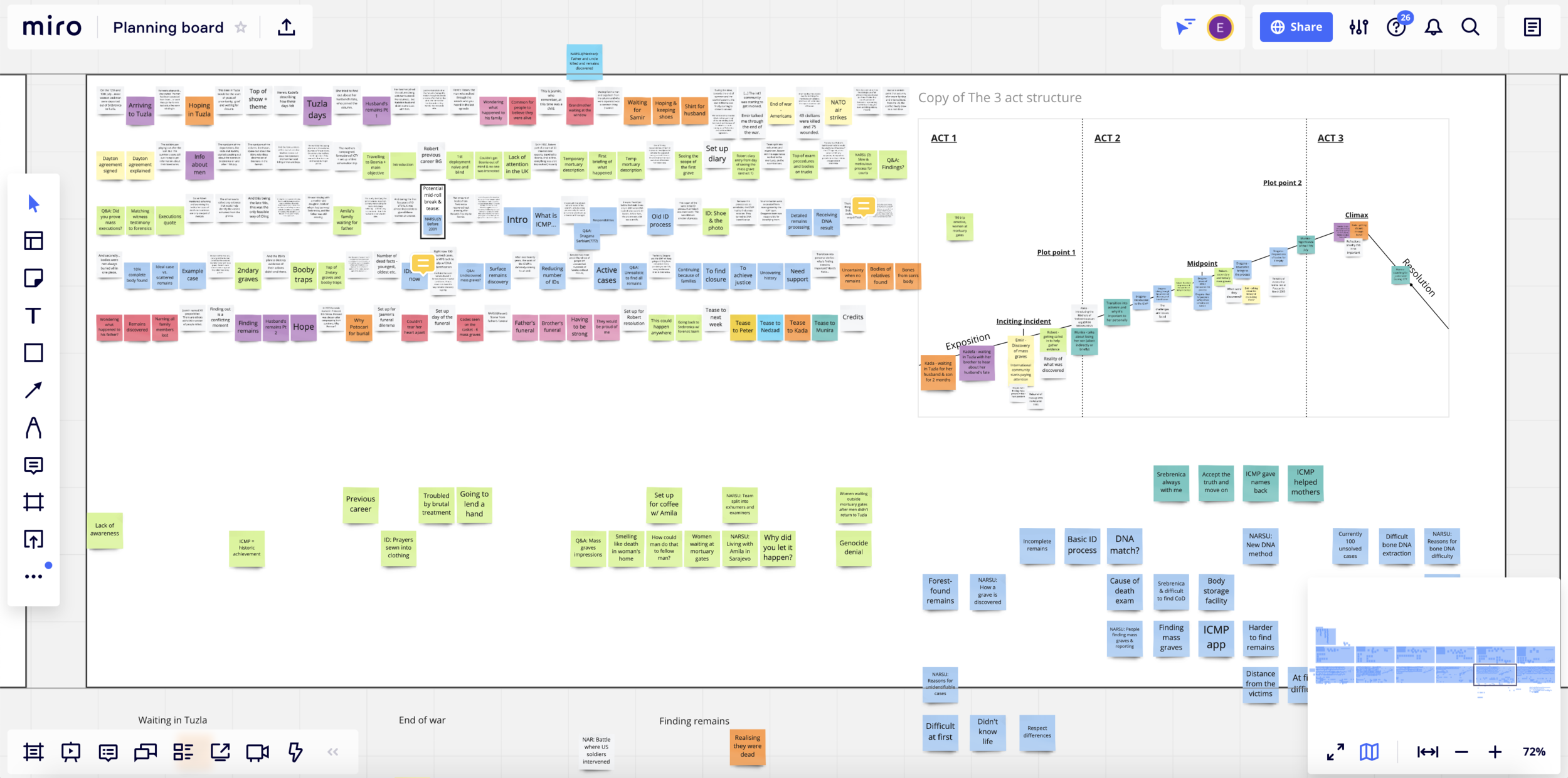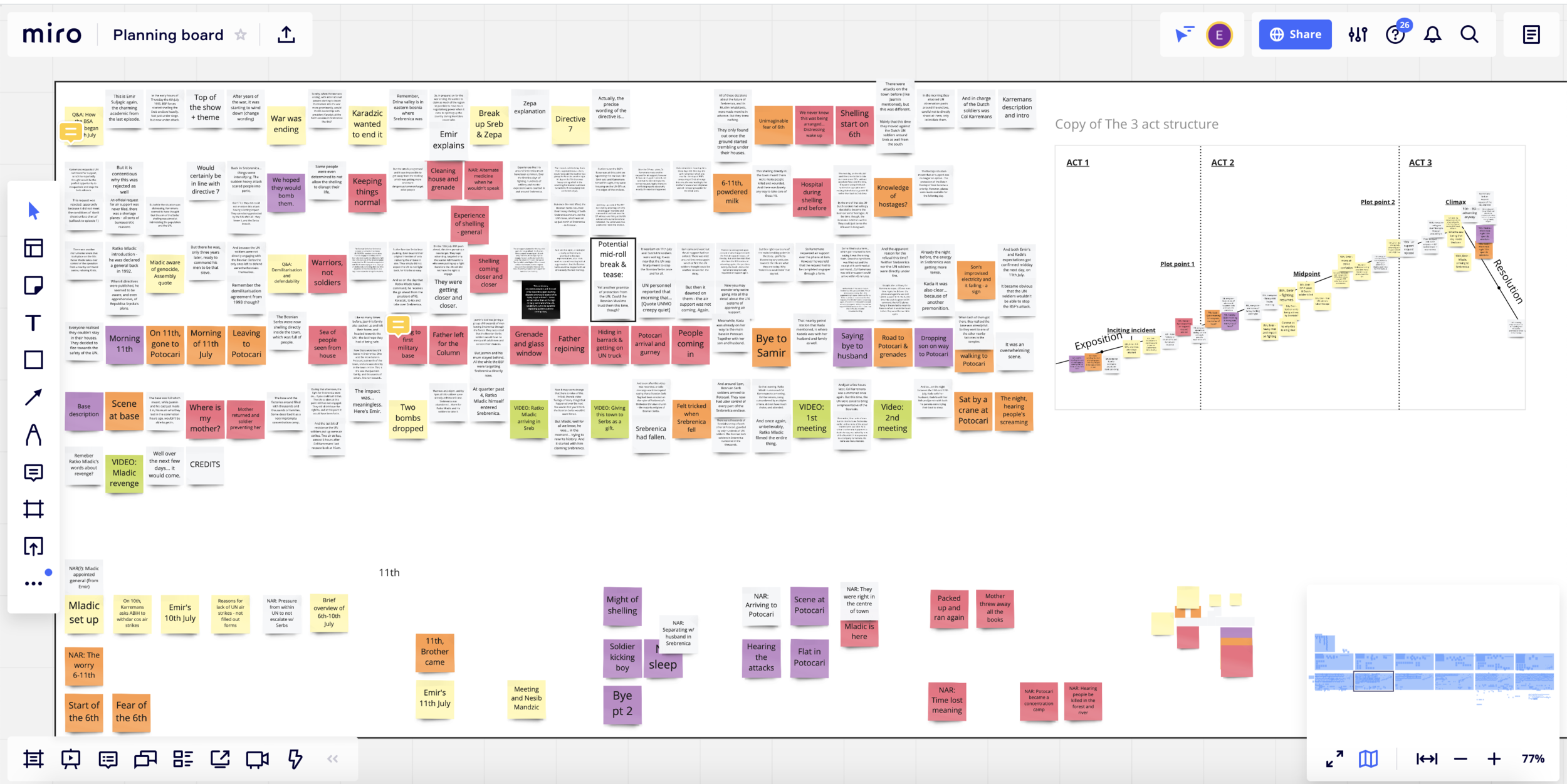Remembrance and education through the power of podcasting with Remembering Srebrenica
We worked with Remembering Srebrenica to create Untold Killing, an award winning podcast dedicated to archiving the tragic human stories from the Srebrenica genocide.
Over a week in the summer of July 1995, more than 8,000 men and boys were systematically killed in a small Bosnian town called Srebrenica. We co-produced Untold Killing with Remembering Srebrenica to tell this little-known story of genocide and ethnic cleansing right in the heart of Europe, forming part of the 25th anniversary remembrance of the event.
A uniquely sensitive and important project, we worked with survivors to gather and share their stories through the power of podcasting. Kate Williams of Remembering Srebrenica said of this project: “Due to coronavirus we have had to cancel our in-person events [for the anniversary year]. We needed to tell the story of the Srebrenica genocide in a way we have not done before which would reach an audience we had not reached before.”
The Takeaways
Planning is the key to complex projects with multiple sources
Sensitivity and research are equally required to tell real life stories
A successful co-production requires mutual collaboration and trust
Podcasts can illuminate even the most complex historical information in an accessible way
The Challenge
Remembering Srebrenica aims to educate and memorialise the events of the genocide, as well as creating community champions who meet survivors and learn about anti-racism and cohesion in society, to prevent such atrocities from recurring and fight against genocide denial. Being unable to take champions to Bosnia this year, the aim was to create a legacy project that would serve the community and the world. Kate says:
Throughout this year, there has been an increase in far-right conspiracy theories and genocide denial, and creating something that allowed for people to hear the first-hand accounts of what happened is an important aspect in combatting the insidious nature of denialism and to encourage critical thinking surrounding the spread of far-right misinformation online.
Choosing a podcast felt appropriate, as few podcasts had ever tackled the subject. This would provide a long-lasting resource for the future. As the world’s leading English language charity on Srebrenica, and without much written history about the genocide, it was vital to ensure every part of the podcast series was as accurate as possible to tell this story in a clear and factual way. As international courts continue to grapple with the events that occurred, the challenge included the need to ensure that every word came directly from an eye witness or report, without speculation on the events described.
The Process
With such an important subject and human stories at stake, the process involved a lot of research for our Producer, Jake Otajovic, before formulating the idea for a series of episodes. Jake says the episode plan, “Really focused on the human stories and the impact of these huge global decisions on these people.”
Focusing on survivor stories presented challenges: in particular, we had limited remote access to our interviewees, who were mainly based in Bosnia, and interviews had to be carefully and sensitively arranged, as we didn’t want to re-traumatise our interviewees. Remembering Srebrenica worked with us to prepare and reach out to survivors, teaching us about the ethical interviewing style required for this very specific situation. Meanwhile, we worked to mail out microphones, instruct on their use, and provide a ‘floating mic’ on hand in Bosnia, which was being driven from place to place to ensure the project continued on time. Pandemic aside, we were able to reach out and gather the stories to create a comprehensive series for a global audience.
Insights Explained
Learning 1: Planning is the key to complex project with multiple sources
Jake says that the logistical effort to make a podcast in Bosnia during a pandemic was complex, but by mailing out mics and supporting our interviewees, we were still able to gather the stories we needed. This was helped by the information our co-producers had on hand, which ensured that we were able to create the story structure before pressing record. Jake created one heck of a project plan, and you can see an example of it here:
Jake pieced together the puzzle from the interviews into a bigger narrative structure. He says, “I had this big structure broken down into episodic structures… [then I] ran it past Aleks, our host, who has a connection to Bosnia. There were parts of the script where we worked together [but] because the story is so sensitive, we couldn't allow too much room for interpretation - we had to present things objectively and carefully.” Aleks’ fantastic delivery of the narration helped to fill the gaps in the story and create cohesive episodes.
Planning was therefore key to the execution of this project, and if we were to plan it again, we’d go even further to schedule each and every aspect with even more accuracy.
Learning 2: Sensitivity and research are equally required to tell real life stories
Jake says, “I spent weeks just reading, watching, talking to Kate [and using] a lot of materials that were for schools, to understand the event... The very first step was the research.” Thanks to thorough documentation of the stories, Jake was able to use this to create the initial structure. From there, “We’d send [survivors] out a little outline about what parts of the story we wanted to focus on.” This required an acknowledgement of the sensitivity required to talk about a traumatic topic.
This was a huge consideration - we worked to make sure interviewees were aware of and comfortable with what we were asking them for. Pre-interviews were tricky with our older interviewees, for whom technology factors proved a limitation. So this had to be managed as and when we could speak to our sources. We learned a lot about the ethical demands of a historical podcast project as a result.
Learning 3: A successful co-production requires mutual collaboration and trust
A co-production requires mutual trust. We were lucky to have access to Remembering Sbrerenica’s rich information sources, of which Jake says: “Kate was able to fact check what could be said. It was such a great partnership - everything we put in was exactly the right information.” Kate adds: “We provided consultancy and support but we had to trust in our partners, that they will take on board our needs and concerns and understand the audience.” With mutual trust, a co-production can create real synergy for quality results.
Learning 4: Podcasts can illuminate even the most complex historical information in an accessible way
With almost no podcast resources on Srebrenica in existence, Kate knew this was a gap waiting to be filled. As a growing charity, they wanted to spread their message with care and consideration, as well as in an intimate and accessible manner. Believing in the power of podcasts to do this, the complexity of the podcast produced a streamlined result that Remembering Srebrenica were really delighted with.
Kate says, “We wanted to help archive the testimony of survivors, and see this as an important way of recording history so the stories will not be lost, or denied by those who try to claim the crime never happened. We want those new to the topic to be able to hear the emotive and heart-breaking stories of survivors, but also to understand the series of events that occurred in July 1995 that led to genocide in Srebrenica, so it can never happen again.” Untold Killing has become the definitive podcast on the subject, making its way into university reading lists worldwide.
The Impact
Some of the key metrics that Remembering Srebrenica used to judge the success of the podcast was to determine how Untold Killing impacted attitudes and behaviour. The vast majority of surveyed listeners were more likely to challenge other people’s behaviour - becoming an upstander, rather than a bystander. Also, 54% would be more likely to create an event to bring different communities together for greater social cohesion. Almost all respondents said they now understood the relevance of the events in the podcast, and were aware of Remembering Srebrenica’s work.
The podcast is now being used for several of Remembering Srebrenica’s goals, including further community outreach and education, having been added to the reading lists for many universities including University College London, De Montfort University, The University of Coventry, The University of Michigan and The University of Connecticut.
The podcast was also awarded platinum at the AVA Awards, and has been recognised by the audio world too. It has been nominated for ‘Best Commercial Partnership’ and ‘The Impact Award’ at the ARIAS — the Oscars of UK radio and audio.
With the podcast reaching over 90,000 listeners so far, Kate says finally, “We would never have been able to produce this alone. The expertise and support Message Heard provided was incredible, and the quality of what we created has been reflected by great feedback. There might be other things about Srebrenica out there, but this is the best… For a documentary with 11 interviews across several countries - having a partner is priceless. We couldn’t have done it otherwise.”
Read more about this project here.
Want to learn more? At Message Heard, we make podcasts that help your brand reach new audiences. Find out how we can help you by getting in touch.





